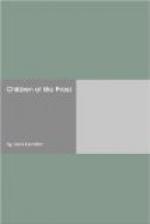“But he had no doings with the off-shore wind,” Opee-Kwan retorted. “He went away into the heart of the land, and it is in the nature of things that a man may go on and on into the land.”
“And likewise the sea. But that is neither here nor there. It is said ... that thy father’s father told strange tales of the things he saw.”
“Ay, strange tales he told.”
“I, too, have strange tales to tell,” Nam-Bok stated insidiously. And, as they wavered, “And presents likewise.”
He pulled from the bidarka a shawl, marvellous of texture and color, and flung it about his mother’s shoulders. The women voiced a collective sigh of admiration, and old Bask-Wah-Wan ruffled the gay material and patted it and crooned in childish joy.
“He has tales to tell,” Koogah muttered. “And presents,” a woman seconded.
And Opee-Kwan knew that his people were eager, and further, he was aware himself of an itching curiosity concerning those untold tales. “The fishing has been good,” he said judiciously, “and we have oil in plenty. So come, Nam-Bok, let us feast.”
Two of the men hoisted the bidarka on their shoulders and carried it up to the fire. Nam-Bok walked by the side of Opee-Kwan, and the villagers followed after, save those of the women who lingered a moment to lay caressing fingers on the shawl.
There was little talk while the feast went on, though many and curious were the glances stolen at the son of Bask-Wah-Wan. This embarrassed him—not because he was modest of spirit, however, but for the fact that the stench of the seal-oil had robbed him of his appetite, and that he keenly desired to conceal his feelings on the subject.
“Eat; thou art hungry,” Opee-Kwan commanded, and Nam-Bok shut both his eyes and shoved his fist into the big pot of putrid fish.
“La la, be not ashamed. The seal were many this year, and strong men are ever hungry.” And Bask-Wah-Wan sopped a particularly offensive chunk of salmon into the oil and passed it fondly and dripping to her son.
In despair, when premonitory symptoms warned him that his stomach was not so strong as of old, he filled his pipe and struck up a smoke. The people fed on noisily and watched. Few of them could boast of intimate acquaintance with the precious weed, though now and again small quantities and abominable qualities were obtained in trade from the Eskimos to the northward. Koogah, sitting next to him, indicated that he was not averse to taking a draw, and between two mouthfuls, with the oil thick on his lips, sucked away at the amber stem. And thereupon Nam-Bok held his stomach with a shaky hand and declined the proffered return. Koogah could keep the pipe, he said, for he had intended so to honor him from the first. And the people licked their fingers and approved of his liberality.
Opee-Kwan rose to his feet “And now, O Nam-Bok, the feast is ended, and we would listen concerning the strange things you have seen.”




